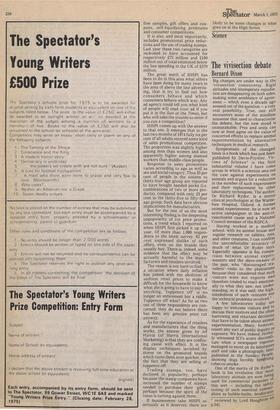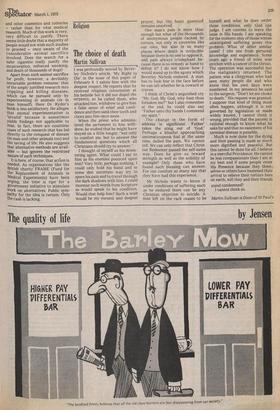Science
The vivisection debate
Bernard Dixon
Big changes are under way in the 'vivisection' controversy. Rigid attitudes and intemperate repudiation are disappearing on both sides, making some semblance of agreement which even a decade ago seemed out of the question a very real possibility. True, one still encounters some of the mindless nonsense that used to characterise the debate, but the new mood is unmistakable. Pros and antis can now at least agree on the value of concerted efforts to replace animal experimentation by alternative techniques in medical research.
Symptomatic of the changed times is a book which has just been published by Davis-Poynter. Victims of Science* is the first substantial volume I have come across in which a scientist sets out the case against experiments on animals and argues for a reduction in the number of such experiments and their replacement by other laboratory techniques. The author, Dr Richard Ryder, is a senior clinical psychologist at the Warne fore Hospital, Oxford. A former animal experimenter, he is now an active campaigner in the anti-vivisectionist cause and a National Council member of the RSPCA. Having worked in a medical school, with its animal house and regular research on rabbits, rats, and other creatures, I can confirm the uncomfortable accuracy of much of what Dr Ryder says. Especially apposite is his comparison between animal experimenters and the slave-owners of the past, who "discouraged travellers' visits to the plantations because they considered that such visitors were not experts and 'therefore tended to react emotionally to what they saw, not understanding, so it was said, the highmindedness of such ventures nor the technical problems involved." A few laboratories today are happy to welcome visitors and to discuss their motives and the often harrowing and reluctant decisions that have to be taken about animal rexperimentation.esent a n y so rt o f My,publican howeveroy or exposure. We have, indeed, recently witnessed ICI's acute discomfiture when a newspaper reporter managed to enrol on its laboratorY staff and take a photograph, later published in the Sunday Po9Ple' showing dogs forcibly breathing tobacco smoke. One of the merits of Dr Ryder book is his revelation that 111°5a laboratory animals are now beinl used for commercial purposes 0 this sort including the safetY testing of such essential comrn?: dities as bubble-baths, deodora
reviewed by Lord Houghton °I1 p.241. and other cosmetics and toiletries – rather than for vital medical research. Much of this work is very, very difficult to justify. There seems little doubt that a majority of People would not wish such studies to proceed – once aware of the considerable animal sacrifice involved. Does the search for a safer cigarette really justify the incarceration, enforced smoking, and death of thousands of dogs?
Apart from such animal sacrifice for profit,' however, a devilishly Intractable problem remains: that of the amply justified research into crippling and killing diseases, which can be pursued only by experimenting in animals (or in man himself). Here Dr Ryder's book is less satisfactory. He alleges that animal experimentation is 'Invalid' because it sometimes Yields findings not applicable to man. In fact, there are countless cases of such research that has led directly to the conquest of disease (in man and other animals too) and the saving of life. He also suggests that alternative methods are available — but ignores the restricted' nature of such techniques.
It is here, of course, that action is needed. As organisations like the British charity FRAME (Fund for the Replacement of Animals in Medical Experiments) have been Urging, the time is ripe for a government initiative to stimulate work on alternatives. Public sympathy for the idea is Certain. Only the cash is lacking.


































 Previous page
Previous page